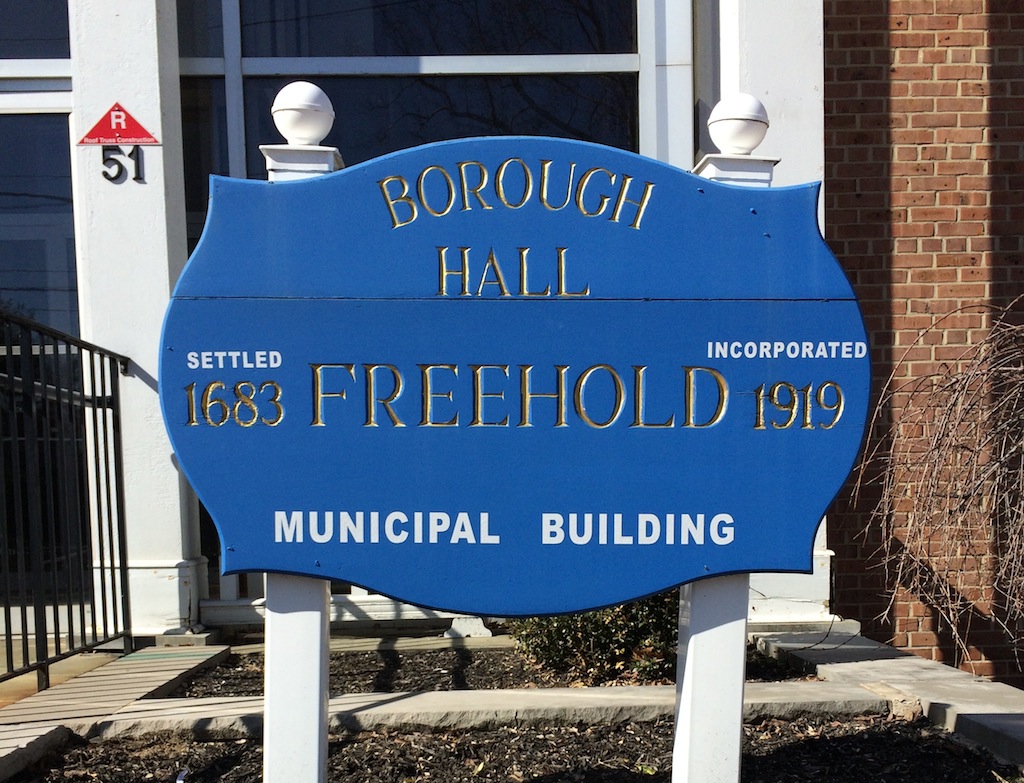By Matthew Sockol
Staff Writer
FREEHOLD – Plans intended to solve issues at Freehold Borough’s water treatment plant have been presented to the Borough Council.
On June 20, engineer Brian Dougherty of Mott MacDonald discussed the current status of the water treatment plant with municipal officials and described how deficiencies and necessary upgrades at the facility could be addressed.
According to Dougherty, the plant, which is on Waterworks Road, is maintained and operational with no major service disruptions and operators are meeting New Jersey Department of Environmental Protection (DEP) finished water quality standards.
However, he said the plant was constructed more than 65 year ago, was last upgraded nearly 40 years ago and he reported that the major equipment is approaching the end of its useful life service.
The plant was constructed in 1949 and had four pressure filters, an aeration system and a detention tank, according to Dougherty. In the mid-1960s, the plant was expanded to include two additional pressure filters.
The most recent upgrade at the plant occurred in 1977, which saw the addition of two more pressure filters, a backwash waste water basin and sludge drying beds.
Dougherty cited several deficiencies at the plant and told council members that four filters, the aeration tank, the detention tank, the power distribution system and the control system are nearing the end of their useful service life. He said the control system has minimal monitoring and alarm functionality and reiterated the issues caused by aging equipment.
Furthermore, the treatment plant faces a flooding concern because it is adjacent to McGellairds Brook and within the borough’s 100-year floodplain. The plant was temporarily shut down during post-tropical storm Irene in 2011 due to flooding, according to Dougherty.
To address these issues, Dougherty recommended upgrades to valves, pumps and controls, the chemical feed system, the control system and the electrical system. The plant would receive valve actuators to automate operation and a new backwash waste water tank, while the feed pumps would be replaced by automated feed pumps. A programmable logic controller (PLC) control panel for plant operations and a PC-controlled human machine interface (HMI) system would be installed, along with an ethernet-based communications network to interconnect the PLC, the HMI system and remote terminal units.
The proposed improvements, however, will not address the flooding concerns and the pressure filters and aeration and detention tanks at the end of their useful service life. According to Dougherty, it is too expensive to flood-proof the existing plant and it is not practical to replace the existing aeration and detention tanks and the pressure filters.
As an alternate solution, the engineer presented a plan to construct a new facility on the borough’s well field across Waterworks Road from the existing plant.
As explained in the presentation, the new treatment plant would be constructed at a higher elevation outside the flood zone and all of the major equipment would be new. The existing plant would remain operational while the new facility is being built, preventing major disruptions to the normal treatment service from occurring and eliminating the need for the borough to purchase water from other sources.
The construction of a new facility was estimated at a higher cost than the recommended improvements to the existing plant.
According to Dougherty, the preliminary cost of the improvements would range from $2.3 million to $3.2 million, not including land, legal, permitting and engineering fees. The estimated cost of a new plant is $4.4 million, not including land, legal, permitting and engineering fees.
Improvements to the existing facility would take more than two years to complete (nine months for the design and permit phase, three months for the bid phase and 15 months for construction). The construction of a new plant would take nearly three years (12 months for the design and permit phase, three months for the bid phase and 18 months for construction), according to the presentation.
Dougherty recommended building a new water treatment plant. He said making improvements to the existing plant would leave Freehold Borough with an older facility that has equipment nearing the end of its service life and susceptible to flooding.
Business Administrator Joseph Bellina recommended the construction of a new water treatment plant. No decision has been made by the council members.

